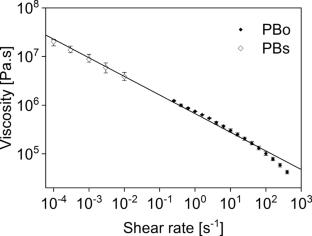Squeeze flow and rheological characterization of pure bitumen and bitumen mixed with kaolin
Abstract
This study dealt with an experimental squeeze-flow test between two parallel disks and rheological measurements using a rotational rheometer of pure bitumen and bitumen mixed with 10 and 20 wt.% kaolin without slip condition. The experimental procedure of the homogeneous samples’ preparation was described. A steady-state and dynamic rheological analysis for pure bitumen and bitumen mixed with kaolin was detailed. Results show that pure bitumen and bitumen mixed with 10 wt.% kaolin at 26 °C correspond to a shear-thinning behavior. The effect of the kaolin particles becomes more critical at low shear rates than at high shear rates, where the matrix effect was dominant. The influence of temperature on bitumen mixed with 20 wt.% kaolin was investigated, and the obtained results show that the samples behave like a power-law model at 50 °C. Besides, the squeeze-flow test impact at an ambient temperature of 26 °C for pure bitumen and bitumen mixed with kaolin was also studied. Adding kaolin leads to a significant increase in viscosity and confirms the studied cases in the rheometry test at 26 °C. It was proven that pure bitumen and bitumen mixed with kaolin follow a power-law model at a specific range of shear rate. In particular, the decrease of the shear rate in bitumen mixed with 20 wt.% kaolin triggers the detection of the yield stress, which did not appear in the rheological measurements due to the applied deformation either in the shear and/or the elongational flow.


 求助内容:
求助内容: 应助结果提醒方式:
应助结果提醒方式:


